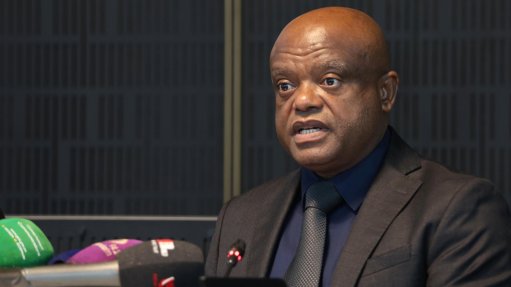SA polity is economically illiterate
This article has been supplied.
By: Bongani Mankewu - Director of the InfraFIN Advisory Institute
Financialization or Financial Repression: Political Advocacy to Solve Inequalities
Given the two existential challenges facing the international financial architecture today: sovereign debt and unemployment, radical reforms, if not revolutions, are imperative. Despite claims that globalization supports sustainable development in Africa and other developing countries, billions of dollars have progressed to wealthy nations, advancing developed countries.
Achieving the Sustainable Development Goals (SDGs) is a major component of the 2030 Development Agenda, prioritizing infrastructure worldwide.
A report from the United Nations (UN) recently indicated that the SDG financing gap for developing countries has reached $4 trillion a year due to global shocks, such as the COVID-19 pandemic, geopolitical conflicts, and economic instability. International financial architecture design has demonstrated structural flaws in recent years, which has prompted reforms. The global financing gap and debt crisis have worsened poverty and inequality, putting the world off track to meet international targets set at the end of 2015. The hegemony of finance over the economy and politics contributed significantly to South African inequality.
There is a need for humane consideration and a fair balancing act in South Africa's current inflation-targeting regime, which is profit-driven, growth-averse, and undermines employment. Meanwhile, with current inflation targeting, South Africa has an ignoble unemployment rate and poor economic performance. Global trends in commodity prices directly impact inflation in the South African economy, as do other macroeconomic variables, such as real exchange rates. Is South Africa's political system capable of advocating macroeconomics, which controls cunning markets and financial dominance, while calibrating ineffective state intervention in the economy?
South Africa's extreme inequalities have conditioned the world to see the terrible situation through the same prisms as Apartheid. South Africa ought to take the lead and develop a body of thought and a set of practices to resolve corruption, odious debt-laden crises, and inhumane inequalities. As part of the global financial architecture reforms, SA can more effectively challenge finance capital's ascendancy and Americanization over humanity by the US Treasury, Wall Street, and IMF complex. Through the Americanization of global finance, wealth ceases to trickle downward as propagated but instead spirals upward, channeled through structural adjustment, financialization, and austerity as policy orientations.
Financialization needs to be understood alongside financial repression to reach a genuine and lasting solution to South Africa's deplorable and unacceptable social inequities.
Private financial institutions' shrewd regulatory control over the economy is a hallmark of financialization. As interest rates rose and liberalization progressed, non-finance corporations' declining retained earnings led to a dramatic slowdown in investment, with adverse consequences for the labour market.
A colleague at a conference explained the term "financialization" to the audience, "As you may have heard about the families allegedly capturing the state in South Africa, financialization is the captive practice of the economy by financial institutions".
Contrariwise, “Financial repression” is an economic term that refers to governments borrowing from industry to repay public debts. These measures are presumed to be repressive because they disorient savers while enriching the government.
South Africa lacks a polity capable of navigating the social balance between the hegemony of finance ("financialization") and supervising governance in the use of state assets ("financial repression") to address inequalities.
Being the prototype of financialized industrial capital, South Africa should take the lead on these financial reforms more than any other nation on the planet. Financialized industrial capital wants a strong state to serve itself, but not to serve labour, consumers, the environment, or long-term social progress at the cost of eroding profits and rents.
It is evident from the current financial architecture that industrialization and financialization cannot coexist in developing nations without hurting social equality and employment.
South Africa is far more vulnerable than any other country to the current financial architecture's two critical imbalances: sovereign debt and unemployment. The use of artificially set interest ceilings, capital controls, and inflation to resolve public debt can potentially befuddle domestic savers and bondholders.
Based on economic literature, "How to Pay for the War" as a policy prescription for financial repression influenced policymakers. As Reinhart and Sbrancia (2015) claim, it irradiated the operation of an 'inflation tax' by discussing the relationship between state budgets and monetary depreciation.
Recently, "How to Pay for the War" has been explicitly proposed as a financial policy guide in the calamity of rising debt levels (Sanz Bas 2019).
Although inflation is not included in all definitions of 'financial repression', it has generally been considered instrumental in driving down real interest rates, as the devaluation of money devalues bondholders' nominal debt (Teupe, 2020).
Indeed, the state's control of interest rates and instrumentalization of inflation figure prominently in “How to Pay for the War”. Undeniably, South Africa is experiencing an existential crisis that seeks attention from all societal formations. The elusive National Dialogue preparations.
According to the National Treasury, South Africa pays 21 cents of every rand collected for debt interest, amounting to R1.21 billion per day. Statistics South Africa recently released unemployment data, indicating that the country is heading for a cliff, contrary to popular belief.
The current state of the economy and society necessitates a polity capable of deriving balancing equations of some of the critical factors - a demand-led growth regime, wage-led or profit-led regime, and inflation-targeting regime - within South Africa's macroeconomic framework. South African politics must find economic clarity to benefit society regarding the dominance of finance "financialization" or regulatory capture, and government studious or inadvertently subverting markets and abusing the financial system "financial repression."
The sanguine response of the South African Reserve Bank during the 2008 financial crisis, which principally protected the banking system, should be repeated in these times of chronic unemployment and inequality. To deal with the global crisis's spillover effects, the SARB has shown considerable flexibility and pragmatism. The same pragmatic zeal is required to address debt and unemployment levels.
The obvious impetus for developing novel policy tools to reroute the economy is the crumbling infrastructure currently ruining the economy. These class-based disparities that threaten to explode as a time bomb for society ought to be urgently addressed.
The Reserve Bank should collaborate with financial institutions, industrialists and entrepreneurs, academia, transaction advisory firms, and organized business formations, to devise instruments and programs that facilitate credit allocation for effective job-creating activities.
The question remains: do we have a political system with sufficient economic literacy to develop a macroeconomic policy framework capable of eliminating sovereign debt and unemployment?
Article Enquiry
Email Article
Save Article
Feedback
To advertise email advertising@creamermedia.co.za or click here
Press Office
Announcements
What's On
Subscribe to improve your user experience...
Option 1 (equivalent of R125 a month):
Receive a weekly copy of Creamer Media's Engineering News & Mining Weekly magazine
(print copy for those in South Africa and e-magazine for those outside of South Africa)
Receive daily email newsletters
Access to full search results
Access archive of magazine back copies
Access to Projects in Progress
Access to ONE Research Report of your choice in PDF format
Option 2 (equivalent of R375 a month):
All benefits from Option 1
PLUS
Access to Creamer Media's Research Channel Africa for ALL Research Reports, in PDF format, on various industrial and mining sectors
including Electricity; Water; Energy Transition; Hydrogen; Roads, Rail and Ports; Coal; Gold; Platinum; Battery Metals; etc.
Already a subscriber?
Forgotten your password?
Receive weekly copy of Creamer Media's Engineering News & Mining Weekly magazine (print copy for those in South Africa and e-magazine for those outside of South Africa)
➕
Recieve daily email newsletters
➕
Access to full search results
➕
Access archive of magazine back copies
➕
Access to Projects in Progress
➕
Access to ONE Research Report of your choice in PDF format
RESEARCH CHANNEL AFRICA
R4500 (equivalent of R375 a month)
SUBSCRIBEAll benefits from Option 1
➕
Access to Creamer Media's Research Channel Africa for ALL Research Reports on various industrial and mining sectors, in PDF format, including on:
Electricity
➕
Water
➕
Energy Transition
➕
Hydrogen
➕
Roads, Rail and Ports
➕
Coal
➕
Gold
➕
Platinum
➕
Battery Metals
➕
etc.
Receive all benefits from Option 1 or Option 2 delivered to numerous people at your company
➕
Multiple User names and Passwords for simultaneous log-ins
➕
Intranet integration access to all in your organisation

















